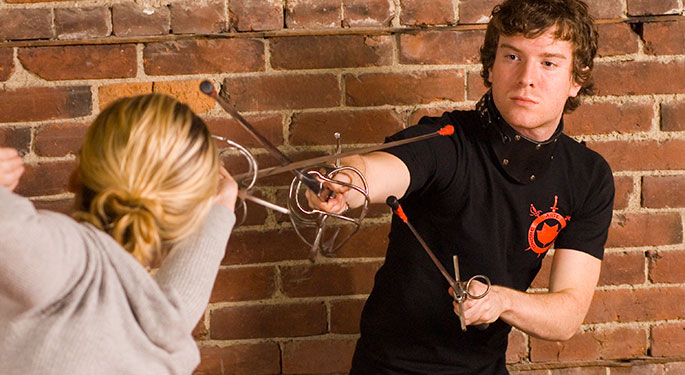"The difference between an advanced action and a simple action is that an advanced action is a simple action done very, very well."
A student and colleague of mine reminded me of this quote recently. I very much enjoy its sentiment every time I’m exposed to it. It reminds me of how much of my energy is best served in honing and conditioning the building blocks of swordplay instead of getting caught up in what’s sexy and new (though, there is a place for that too).
In a recent interview I listened to with US Gymnastics Coach Christopher Sommer, he commented that a key difference between Chinese gymnasts and American ones is that Chinese gymnasts tend to have a much higher tolerance for the repetition of skills that are already in their repertoire. American gymnasts, he said, are often harder to keep on task to repeat something that isn’t a new challenge. The Chinese gymnasts are then, in his view, able to perform those core skills at a higher level in competition, especially high pressure competition. This level of competence, through repetition, is also a core ingredient in feeling confident in your ability to perform, thus helping you psychologically as well as physically.
There is certainly something ingrained in our culture to get bored easily with repetition (I see this in myself and my students). Our minds are hungry for variation, new challenge, and distraction. Activating the willpower to keep on task is often a losing battle; there is only so much will in the will-bank to activate in a given period of time. I’ve found that automating a part of my mental process, so I just “do", instead of thinking, can have a tremendous impact on my ability to stay on task. Here are a few of the techniques I use to do that:
Use a Timer App
I use both UltraTimer and Seconds (available for both iOS and Android) to run simple and complex training timers. Most simply, I will put on a series of one minute intervals, separated by ten second breaks, that I will use for practicing a given skill (solo and partnered). During that minute I am repeating that practice without pause. That might repeat 20 times, and during that time I will only focus on the one skill, or perhaps cycle between two or three related skills.
I also use timer apps to manage a more complex training plan where the timer itself instructs me to move through a series of target skills I want to keep conditioning. What is powerful about the timers is that I only need to use my willpower once: to get me to the training session. Then, I just follow the timer instructions and do my thing and avoid much potential procrastination.
Make Repetition Objectives
I have found this particularly useful when I’ve been working on perfecting choreographed assaults or stage combat routines. Once I have the routine memorized, I can more deeply embed its movements in my muscle memory and develop greater physical conditioning in its performance by getting in a lot of reps. I just decide that I’m going to do X number of reps in a row before stopping. I’ve found this little bit of explicit planning can help me get in significantly more reps than if I merely make a time to practice.
Beyond setting yourself a number of reps to perform, you can set daily objectives for reps, increase the number of reps you do each day, or do a variation of the playing card workout to make the way you approach your reps more random.
Listen to Music or Podcasts
I certainly have a highly distractible mind. Putting on a bit of music or even listening to a podcast can be a helpful way to keep this distractible part engaged while I do something more repetitive with my body. I use this type of trick only when I’m working on a fine motor program skill that I know well. If what I’m listening to is engaging me highly, and the skill I’m practicing requires a lot of mental focus, I risk lowering the quality of my practice. You want to make sure you have a high number of reps done with high quality.
Manage Complexity
Sometimes, all you really need to remain engaged is to make things more challenging while staying within the target skill. This can accomplished by simply adding speed, which requires a higher level of mental presence and physical precision to maintain. You can also add timing challenges (cues from a partner given at random) or add prelude techniques (techniques that are executed ahead of the target technique, such as a disengage before a lunge). The important thing is to not add so much complexity that you significantly reduce your repetitions or overwhelm your ability to mentally focus on improving the target skill.
Getting to your training session itself might still require some work, but through techniques like these you can make those training sessions you do get to significantly more valuable.
If you're looking for an opportunity to hone your skills, the Academie Duello Fall Instructor Intensive is a great opportunity. In the 50-hour program I focus on helping you refine your rapier and longsword skills while giving you tools and strategies for developing excellent learning and practice environments. My main focus of the week is to teach people to be empowered practitioners. Join me October 17th to 21st. Also feel free to contact me with any questions you may have. Spaces are filling up quickly. More info and registration here.
